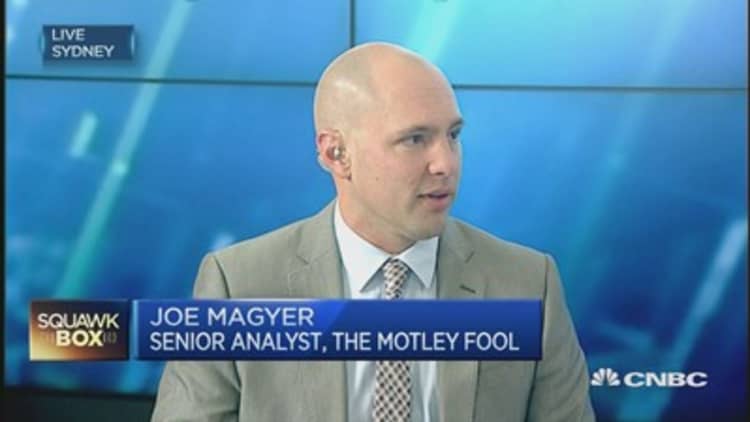It may only come as a surprise to a few, but Australian companies that miss estimates or announce anything this earnings season are being punished.
This morning, shares in hearing implant maker Cochlear have been drilled as much as 14.8 percent, making it the latest big-name Australian company to cop a beating for missing analysts' expectations. Even shares in Apple don't get hit that hard.
The first week of reporting season is barely over, so will the results and reactions improve from here?

Australia's benchmark S&P/ASX 200 is trading on a price earnings multiple of 16 times financial year 2016 earnings, which is about 10 percent higher than its average over previous decades. The market's forward dividend yield is 4.9 percent, which is still respectable compared to the central bank's official cash rate of 2 percent. The yield compression as investors search for yield has been allayed by companies lifting their payout ratios and handing cash back to shareholders.
More from the Financial Times:
Immigration slowdown weighs on Australia's growth
Audiology: how a new implant saves hearing
Record sale of Packer mansion highlights Australia housingbubble
But that all means many stocks have been priced for perfection, which can pave the way for disappointment.
Cochlear, arguably one of the most innovative companies in Australia and a market darling more often than not, reported a 33 percent increase in net profit after tax of A$145.8 million on a 15 percent increase in sales to A$925.6 million. But this fell short of the A$156 million figure analysts were looking for. Also disappointing in a market keen for dividend growth, the company's full-year payout fell 25 percent to A$1.90 per share.
Just as troublesome, Cochlear said it sees net profit in FY16 of A$165 million to A$175 million (based on an exchange rate of one Australian dollar buying $0.75), which is below market forecasts of A$183.6 million.
Cochlear's share price drop today is its biggest since an 18 percent fall in June 2013, and could be only the seventh time in the company's 20-year listed history it has fallen by double-digits in a day.
Read MoreTrouble in paradise for Australia's property speculators
Yesterday, shares in Ansell tumbled 15.8 percent to an eight-and-a-half-month low after the glove and condom-maker said at its full-year result it expected earnings per share for the 2016 financial year to be between A$1.05 to A$1.20 per share, owing to foreign currency effects and a higher effective tax rate. Ansell reported EPS of A$1.20 in the 2015 financial year.
On Friday, Orica shares fell 16.9 percent as the explosives and chemicals maker announced it would book a non-cash impairment charge of A$1.65 billion after tax in its financial year 2015 results and downgraded profit. The company said net profit after tax would be 10 percent to 15 percent below the mean point of broker forecasts of A$490 million.
Also on Friday, shares in ANZ tumbled 7.5 percent - the bank's biggest one-day fall since November 2008 and its seventh-biggest one-day fall since 1989 - after announcing a A$3 billion capital raising and a profit downgrade for the nine months to June 30.

